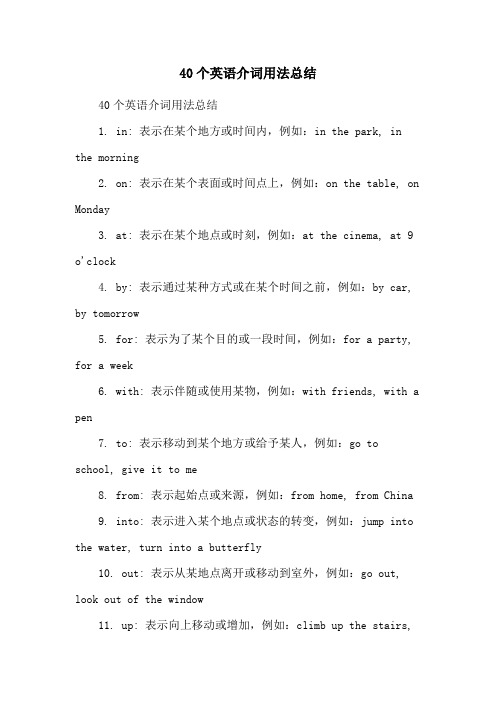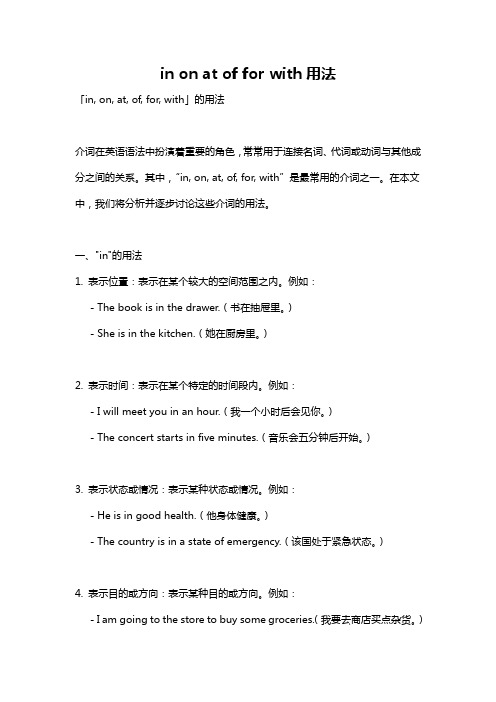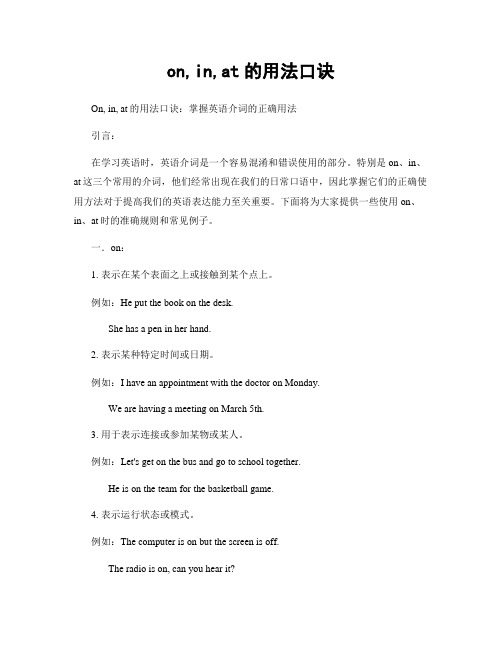英语in-on-at-off等介词的用法
40个英语介词用法总结

40个英语介词用法总结40个英语介词用法总结1. in: 表示在某个地方或时间内,例如:in the park, in the morning2. on: 表示在某个表面或时间点上,例如:on the table, on Monday3. at: 表示在某个地点或时刻,例如:at the cinema, at 9 o'clock4. by: 表示通过某种方式或在某个时间之前,例如:by car, by tomorrow5. for: 表示为了某个目的或一段时间,例如:for a party, for a week6. with: 表示伴随或使用某物,例如:with friends, with a pen7. to: 表示移动到某个地方或给予某人,例如:go to school, give it to me8. from: 表示起始点或来源,例如:from home, from China9. into: 表示进入某个地点或状态的转变,例如:jump into the water, turn into a butterfly10. out: 表示从某地点离开或移动到室外,例如:go out, look out of the window11. up: 表示向上移动或增加,例如:climb up the stairs,wake up12. down: 表示向下移动或减少,例如:walk down the hill, calm down13. about: 表示关于某事或在某个范围内,例如:talk about the movie, wander about the city14. off: 表示离开或关闭,例如:get off the bus, turnoff the lights15. on: 表示打开或激活,例如:turn on the TV, switch on the computer16. over: 表示越过或在某地上方,例如:jump over the fence, fly over the city17. under: 表示在某物下面或被控制或影响,例如:hide under the bed, live under his rules18. with: 表示具有某种特征或和某人一起做某事,例如:a man with blue eyes, dance with me19. without: 表示没有某物或在缺乏某物的情况下,例如:go without food, live without regret20. by: 表示通过某种方式,例如:learn by doing, go by bus21. through: 表示穿过某物或完成某事,例如:walk through the door, go through the documents22. across: 表示横穿某物或在某个范围内,例如:swimacross the river, all across the world23. between: 表示在两个事物之间或在某个时间段,例如:choose between two options, between 9 and 10 o'clock24. among: 表示在三个或三个以上事物之间或在某群人中,例如:share among friends, discuss among colleagues25. around: 表示在周围或在某个时间点附近,例如:walk around the park, around midnight26. through: 表示通过某事物或在某段时间内,例如:read through the book, work through the night27. against: 表示反对或靠在某物上,例如:fight against injustice, lean against the wall28. for: 表示代表或支持某人或某事,例如:vote for a candidate, fight for freedom29. towards: 表示朝向某个方向或对某人有好感,例如:walk towards the beach, feel towards someone30. within: 表示在某个时间或范围内,例如:arrive within an hour, within the city limits31. beyond: 表示超出某个界限或超过某个程度,例如:beyond expectations, beyond the horizon32. along: 表示沿着某个路线或伴随某人一起,例如:walk along the street, sing along with the song33. above: 表示在某物之上或高于某个程度,例如:flyabove the clouds, above average34. below: 表示在某物之下或低于某个程度,例如:swim below the surface, below freezing35. beside: 表示在某物旁边或和某人一起,例如:sit beside me, beside the lake36. near: 表示在某物附近或接近某个时间,例如:live near the beach, near the end37. past: 表示经过某个地点或在某个时间之后,例如:walk past the store, past midnight38. around: 表示在周围或大约某个数量,例如:look around the room, around 20 people39. after: 表示在某个时间之后或追求某人或某事,例如:after dinner, run after the dog40. before: 表示在某个时间之前或在某个事件之前,例如:before sunrise, before the meeting这些介词是英语中常用的一些基本介词,它们在表达地点、时间、方式等方面起到了重要的作用。
初中英语介词的用法

介词的用法与规则一. 表示地点位置的介词1、at ,in, on, to,offat(1)表示在小地方;(2)表示“在……附近,旁边”in(1)表示在大地方;(2)表示“在…范围之内”。
on 表示毗邻,接壤,“在……上面”。
to 表示在……范围外,不强调是否接壤;或“到……”区别:1. in表示A地在B地范围之内。
如:Taiwan is in the southeast of China.2. to表示A地在B地范围之外,即二者之间有距离间隔。
如:Japan lies to the east of China.3. on表示A地与B地接壤、毗邻。
如:North Korea is on the east of China.4. off表示“离……一些距离或离……不远的海上”。
如:They arrived at a house off the main road. New Zealand lies off the eastern coast of Australia补充:树上结的果实、叶子和开的花,用介词on, 鸟儿在树上,用介词in。
2)above, over, on 在……上above 指在……上方,不强调是否垂直,与below相对;比如:The bird is flying above my head.over指垂直的上方,与under相对,但over与物体有一定的空间,不直接接触。
比如:There is a bridge over the river.on表示某物体上面并与之接触。
比如:He put his watch on the desk.3)below, under 在……下面under表示在…正下方比如:There is a cat under the table.below表示在……下,不一定在正下方比如:Please write your name below the line.4)in front of, in the front of 在……前面in front of…意思是“在……前面”,指甲物在乙物之前,两者互不包括;其反义词是behind(在……的后面)。
介词in,on,to,off-方位-表达法

There is a beautiful park to the east of the station.
比较下列句子
1.The church is located to the south of the city. 那座教堂在本市的南面。 (该教堂在本市范围之外) 2.The church is located in the south of the city. 那座教堂在本市的南部。
(暗指该国为沿海国家)
三.介词to表方位用法1 “to the+方位名词”,表示“在某范围之外”,强调两者是远离 关系,互不管辖。尤其当两个地方相隔较远,且有湖泊、大海 等区域相隔时,通常用 to。 eg. 1.Japan is to the east of China. 日本在中国的东面。
(日本在中国范围之外,且有日本海分隔)
二.介词on表方位 "on the+方位名词"指的是一个范围紧挨着另一个范围,表示“
两地接壤“,强调两者为相邻关系,但互不管辖。
eg. 1.Guangdong Province is on the southeast of Guangxi. 广东省在广西的东南边。 (广东省与广西在地理位置上是连在一起的,即两者相 邻,却互不管辖)
2.China faces the Pacific on the east.
中国东临太平洋。 (中国与太平洋相邻,为沿海国家)
仿句练习
1.四川省在贵州省的北边。
Sichuan Province is on the north of Guizhou Province.
2.朝鲜在中国的东北面。 Korea is on the northeast of China. 3.那个国家西边与海接界。 The country is bounded on the west by the sea.
in on at of for with用法

in on at of for with用法「in, on, at, of, for, with」的用法介词在英语语法中扮演着重要的角色,常常用于连接名词、代词或动词与其他成分之间的关系。
其中,“in, on, at, of, for, with”是最常用的介词之一。
在本文中,我们将分析并逐步讨论这些介词的用法。
一、"in"的用法1. 表示位置:表示在某个较大的空间范围之内。
例如:- The book is in the drawer.(书在抽屉里。
)- She is in the kitchen.(她在厨房里。
)2. 表示时间:表示在某个特定的时间段内。
例如:- I will meet you in an hour.(我一个小时后会见你。
)- The concert starts in five minutes.(音乐会五分钟后开始。
)3. 表示状态或情况:表示某种状态或情况。
例如:- He is in good health.(他身体健康。
)- The country is in a state of emergency.(该国处于紧急状态。
)4. 表示目的或方向:表示某种目的或方向。
例如:- I am going to the store to buy some groceries.(我要去商店买点杂货。
)- We are traveling to France in order to learn French.(我们去法国是为了学法语。
)二、"on"的用法1. 表示位置:表示在某个较小的平面或曲面上。
例如:- The book is on the table.(书在桌子上。
)- The photo is on the wall.(照片挂在墙上。
)2. 表示时间:表示在某个具体的日期或某一天内。
例如:- The meeting is on Monday.(会议在星期一举行。
15个英语最常见的介词用法-极简英语

15个英语最常见介词(in on at of for...)的深层次含义英文中15个最常见的介词in/ on/at/of/ for/by /with/ from/to/as/ about/ around/ off/ through/ over一、in (在..里面)1.表示真实的位置: in the car/room2表示抽象的位置: in the book/movie3.表示状态: in danger, in trouble; in anger3.表示时间: in the morning/afternoon/evening. in April; in 20104.表示方式: in the way; in English5.表示穿着: in black shoes/T-shirt二、on (紧紧地接触-连着)1.表示真实的位置: on the table/wall2.表示抽象的位置: on the radio/TV; on the topic/event3.表示具体的时间: on Monday; on Monday morning; on May 4th4.表示状态: on duty; on holiday; the game is on三、at(在.点上)1.表示真实的位置: at home/the company/the store2.表示抽象的位置: be good/bad at English3.表示具体的时间: at 3 pm;at night; at the age of 204.表示状态: at work-在工作; at table-在吃饭四、Of(的-从属关系)1.表示"无生命主体的":the window of the room; top of the mountain...2.某某市: the city of Bejing3.表示数量: a piece/bx/bottle/pair.. of五、for(为了/因为/对时间/对.而言/支持赞成)1.表示为了":go for a walk; I come here fr my schoolbag2.表示"因为": Thank you for helping me; for the reason3.表示"时间"和: for 3 days; for a week; for a year4.表示对..而言": It is important for me5.表示”支持,赞成": Are you for this plan or against it?六、by(通过.交通工具/在.附近/街至.时间/被)1.表示"通过.交通工具":by train/subway/plane/air/ship/seaI learn English by watchingEnglish movies.2.表示在附近":a table by the window; the house is by the lake3.表示"截至到..时间":by the end of next week; by 20194.表示"被(被动语态)":English is spoken by people all over the world.七、with (伴随)1.表示"和.起":go with:play with;make friends with;cooperate with2.表示"携有,带有":a county with a long history; a house with a big garden3.表示..工具:cut the apple with the knife4.表示"伴随":with the development of the society;with the help of my teacher;I don't have any cash with me.八、from (远离)1.表示"来自":I am/come from China;a gift from my best friend;a man from America2.由"远离"来记短语:stop/prevent/keep sb from doing sth阻止某人做某事be away from...远离...be different from与.不同be absent from缺席....how far is it from here?它离这远The paper is made from wood.这纸是由木头制成的3.表示..到": from...to...由"指向"来理解下列用法:The road leads to Paris.这条路通往巴黎Smoking is harmful to your health.吸烟有害健康the answer to the question.这个问题的答案九、to (指向..)contribute to对..做贡献on one's way to... 在某人去某地的路上belong to属于..be used to doing sth习惯于做某事lead to...导致十、as作为He works as a tour guide.他作为导游工作。
on,in,at的用法口诀

on,in,at的用法口诀On, in, at的用法口诀:掌握英语介词的正确用法引言:在学习英语时,英语介词是一个容易混淆和错误使用的部分。
特别是on、in、at这三个常用的介词,他们经常出现在我们的日常口语中,因此掌握它们的正确使用方法对于提高我们的英语表达能力至关重要。
下面将为大家提供一些使用on、in、at时的准确规则和常见例子。
一.on:1. 表示在某个表面之上或接触到某个点上。
例如:He put the book on the desk.She has a pen in her hand.2. 表示某种特定时间或日期。
例如:I have an appointment with the doctor on Monday.We are having a meeting on March 5th.3. 用于表示连接或参加某物或某人。
例如:Let's get on the bus and go to school together.He is on the team for the basketball game.4. 表示运行状态或模式。
例如:The computer is on but the screen is off.The radio is on, can you hear it?二.in:1. 表示在某个范围内、位置内或空间内。
例如:She lives in a small town near the mountains.I put my keys in my bag.2. 用于表示时间段或多长时间内发生了什么事情。
例如:I will have a vacation in July for two weeks.He finished the report in two hours.3. 用于表示一种状态或特征。
例如:She is interested in playing the piano.He is fluent in English.4. 表示一种情感、信仰或态度。
英语in on at off等介词的用法
to的用法:一:表示相对,针对be strange (common, new, familiar, peculiar, distinct, sensitive, immune, vulnerable, indispensable) toAir is indispensable to life.Aircrafts are vulnerable to interference caused by radiation.This injection will make you immune to infection.二:表示对比,比较1:以-ior结尾的形容词,后接介词to表示比较,如:superior ,inferior,prior,senior,junior The quarrel happened prior to my arrival.2: 一些本身就含有比较或比拟意思的形容词,如equal,similar,equivalent,analogous A is similar to B in many ways.3:表示一些先后顺序的形容词,如:second,subsequent,next,preliminary,preparatory Subsequent to the war,they returned to their hometown.4: to也偶尔出现在个别动词之后,与动词形成固定词组,表示比较,如:prefer to,compare to,in contrast tocompare to sth.表示比喻或比拟,而compare with sth.表示比较,如:World is usually compared to a stageCompared with his past,he has changed a lot.Prefer的正确句型是:prefer A to B或prefer doing A to doing B,但当prefer后接动词不定式时,表示比较的介词to就要改成rather than ,如:The undaunted soldier preferred death to surrender.Many people prefer spending money to earning money.They prefer to pursue careers rather than remain home as house wives.5: to与及个别的名词构成比较之意,如:alternativeGoing to an under water concert is a great alternative to going to dinner.三: 表示修饰关系1: 表示回复,反应意思的词,如:answer to question,solution to problem,response to inquiry,reaction to proposal,reply to letter2: 表示建筑构件的词汇,如: entry,entrance,approach,access,passage,exit,vent,paththe approach to a bridge引桥the approach to scienceHalf of the population was estimated to have no access to the health service.The access to education 接受教育的机会The access to medical care 享受公费医疗的权利3: 表示人物职位和官衔的词,如:assistant to manager, ambassador to Spain, successor to tradition, heir tothrone,deputy to the National People’s Congressadvisor to the Prime Minister4: 表示权利和许可的词汇,如:right,admissionThe employee finally got the admission to the boardroom.Everyone has an equal right to ……..5: 表示栅栏或障碍的词汇,如:bars to development,the barrier to progress6: 表示与书籍,文本相关的词,如:introduction to passage.7: 表示恭喜或是祝贺,如:The director proposed a toast to the health of the guests.Let’s drink to Dick’s success in business8: 另外还有一些名词符合这种用法,有的具有两者息息相关,缺一不可的含义.如:key to door,invitation toparty,guide to action,limitation to life,accessory to school四: to还具有依据,伴随,和着节奏的含义,如:sing to piano, chance to the tune, stamp to the rhythm of the song, add salt to taste(一):表示相关联,相连接,如:be related to,be relative to,in relation to,be relevant to,link toInvestigate all the facts related to the problem.People often linked walth to happiness.(二):表示反对和赞同。
介词的用法大全
介词的用法大全介词是一种用来表示词与词, 或者词与句之间的关系的词,在句中不能单独作句成分。
介词一定要有宾语,充当宾语的一般有名词、代词或相当于名词的其它词、短语或句子,短语或从句。
2. 介词的种类(1)简单介词,如at, in off, on, by, to, with等。
(2)合成介词,如into, inside, within, throughout等。
(3)短语介词,如according to, because of, in addition to, in front of, in spite of等。
(4)二重介词,如from behind, from among, until after, at about等。
3. 介词的宾语(1)名词:Lets go for a walk along the river. 咱们到江边散散步。
(2)代词:Hes standing in front of me. 我站在我前面。
(3)形容词:Her pronunciation is far from perfect. 她的语音远不是完美的。
注:有的形容词前可看作是省略了being。
(4)动名词:Hes good at drawing.他善长绘画。
(5)过去分词:I took it for granted that she was for England.我还以为她是英国的。
注:过去分词作介词宾语只限于take…for granted 结构和用于regard…as后。
(6)不定式:I had no choice but to lie down. 除了躺下外我别无选择。
She did nothing but cry.她只是哭。
注:介词后通常是不能用不定式作宾语的,只有表示“除……外”的 but, except 等个别介词能接不定式作宾语。
前面有行为动词do时,不定式不用 to,否则要带to。
(7)疑问词+不定式:I dont know how to improve my English.我不知道如何提高我的英语水平。
雅思方位介词
雅思方位介词首先,雅思考试中常用的方位介词有:in、on、at、to、from、into、out of、up、down、off、over、under、above、below、across、through、among等。
接下来,我们来看看这些方位介词的用法:1. in 用于表示“在某个地方内部”,例如:in the room、in the city、in the box等。
2. on 用于表示“在某个物体的表面上”,例如:on the table、on the book、on the wall等。
3. at 用于表示“在某个地方”,例如:at the cinema、at the station、at home等。
4. to 用于表示“朝向某个地方”,例如:go to school、come to my house等。
5. from 用于表示“从某个地方出发”,例如:from the airport、from the hotel等。
6. into 用于表示“进入某个物体内部”,例如:go into the building、put the book into the bag等。
7. out of 用于表示“离开某个物体内部”,例如:get out of the car、take the key out of the lock等。
8. up 用于表示“向上”,例如:go up the stairs、look up at the sky等。
9. down 用于表示“向下”,例如:walk down the hill、writedown the phone number等。
10. off 用于表示“离开某个物体表面”,例如:get off the bus、take the hat off等。
11. over 用于表示“在某个物体之上”,例如:fly over the city、put the blanket over the bed等。
介词in,on.at,for.with,by,of的基本用法
介词用法知多少介词是英语中最活跃的词类之一。
同一个汉语词汇在英语中可译成不同的英语介词。
例如汉语中的“用”可译成:(1)用英语(in English);(2)用小刀(with a knife);(3)用手工(by hand);(4)用墨水(in ink)等。
所以,千万不要以为记住介词的一两种意思就掌握了这个介词的用法,其实介词的用法非常广泛,搭配能力很强,越是常用的介词,其含义越多。
下面就简单介绍几组近义介词的用法及其搭配方法。
一. in, to, on和off在方位名词前的区别1. in表示A地在B地范围之内。
如:is in the southeast of .2. to表示A地在B地范围之外,即二者之间有距离间隔。
如:lies to the east of .3. on表示A地与B地接壤、毗邻。
如:is on the east of .4. off表示“离……一些距离或离……不远的海上”。
如:They arrived at a house off the main road.lies off the eastern coast of .二. at, in, on, by和through在表示时间上的区别1. at指时间表示:(1)时间的一点、时刻等。
如:They came home at sunrise (at noon, at midnight, at ten o’clock, at daybreak, at dawn).(2)较短暂的一段时间。
可指某个节日或被认为是一年中标志大事的日子。
如:He went home at Christmas (at New Year, at the Spring Festival, at night).2. in指时间表示:(1)在某个较长的时间(如世纪、朝代、年、月、季节以及泛指的上午、下午或傍晚等)内。
如:in 2004, in March, in spring, in the morning, in the evening, etc(2)在一段时间之后。
- 1、下载文档前请自行甄别文档内容的完整性,平台不提供额外的编辑、内容补充、找答案等附加服务。
- 2、"仅部分预览"的文档,不可在线预览部分如存在完整性等问题,可反馈申请退款(可完整预览的文档不适用该条件!)。
- 3、如文档侵犯您的权益,请联系客服反馈,我们会尽快为您处理(人工客服工作时间:9:00-18:30)。
英语in-on-at-off等介词的用法to的用法:一:表示相对,针对be strange (common, new, familiar, peculiar, distinct, sensitive, immune, vulnerable, indispensable) toAir is indispensable to life.Aircrafts are vulnerable to interference caused by radiation.This injection will make you immune to infection.二:表示对比,比较1:以-ior结尾的形容词,后接介词to表示比较,如:superior ,inferior,prior,senior,junior The quarrel happened prior to my arrival. 2: 一些本身就含有比较或比拟意思的形容词,如equal,similar,equivalent,analogous A is similar to B in many ways.3:表示一些先后顺序的形容词,如:second,subsequent,next,preliminary,prepa ratorySubsequent to the war,they returned to their hometown.4: to也偶尔出现在个别动词之后,与动词形成固定词组,表示比较,如:prefer to,compare to,in contrast tocompare to sth.表示比喻或比拟,而compare with sth.表示比较,如:World is usually compared to a stage Compared with his past,he has changed a lot.Prefer的正确句型是:prefer A to B或prefer doing A to doing B,但当prefer后接动词不定式时,表示比较的介词to就要改成rather than ,如:The undaunted soldier preferred death to surrender.Many people prefer spending money to earning money.They prefer to pursue careers rather than remain home as house wives.5: to与及个别的名词构成比较之意,如:alternativeGoing to an under water concert is a great alternative to going to dinner.三: 表示修饰关系1: 表示回复,反应意思的词,如:answer to question,solution to problem,response toinquiry,reaction to proposal,reply to letter2: 表示建筑构件的词汇,如:entry,entrance,approach,access,passage,e xit,vent,paththe approach to a bridge引桥the approach to scienceHalf of the population was estimated to have no access to the health service.The access to education 接受教育的机会The access to medical care 享受公费医疗的权利3: 表示人物职位和官衔的词,如:assistant to manager, ambassador to Spain, successor to tradition, heir tothrone,deputy to the National People’s Congressadvisor to the Prime Minister4: 表示权利和许可的词汇,如:right,admissionThe employee finally got the admission to the boardroom.Everyone has an equal right to ……..5: 表示栅栏或障碍的词汇,如:bars to development,the barrier to progress6: 表示与书籍,文本相关的词,如:introduction to passage.7: 表示恭喜或是祝贺,如:The director proposed a toast to the health of the guests.Let’s drink to Dick’s success in business8: 另外还有一些名词符合这种用法,有的具有两者息息相关,缺一不可的含义.如:key todoor,invitation toparty,guide to action,limitation to life,accessory to school四: to还具有依据,伴随,和着节奏的含义,如:sing to piano, chance to the tune, stamp to the rhythm of the song, add salt to taste(一):表示相关联,相连接,如:be related to,be relative to,in relation to,be relevant to,link toInvestigate all the facts related to the problem.People often linked walth to happiness.(二):表示反对和赞同。
1:to引导的表示反对,抗拒,对抗意义的词组。
Be opposed to,be oppsist to,be contrary to,be adverse to,beresistant to,be contradictory to,objectto,oppose to,deny tp,be aline toThese buildings are resistant to earthquake.They are to tally opposed to any changes being made in the plans.2: to引导的表示同意,赞同意义的词组:consent to,subseribe to,The employer consented to give him a salary raise.表示调整,使符合,使适应的含义,如:adapt to,commodate to, adjust to,conformto,habituate to,fit to,suitto,correspond to,cater toShe tried to habituate herself to the style of plain living.Your action should conform to the interests of the people.They offered various foods to cater to the need of customers.His words doesn’t fit to his actions.Suit your writing style to the masses.3: 表示投降,屈服,服从的含义,如:be subject to,be subordinate to,submit to,subjectto,surrender to,give into,confess to,admit to.The minority is subordinate to the majority 少数服从多数Countries nearby oceans are always subject to earthquake.He confessed to having robbed the woman of her wallet.We’re not the kind of people to yield to any military threat.五: 表示趋势或倾向,如:tend to,be proneto,be inclined to,be apt to,be liable toHe’s liable to seasickness.You are liable to come to wrong conclusion.六: 表示对事情的坚持与执着,如:sick to,hold o,adhere to,cling toHe still holds on to his original views.七: 表示约束,局限,如:limit to,confineto,resrict toHe’s confined to the house by illness.He confined his remarks to scientific mangement.八: 表示一种习惯或是一种适应性,如:get (be) to,used to,be accustomed toFinally,the students got used to my teaching method.九: 表示起因和原由,如:owing to,dueto,thanks to,attribute to,come down toThe flight was cancelled due to the thick fog.The famous artist attributed his success to his wife.十: 表示目的或结果,如:aim to,lead to,give rise toI aim to be an excellent college teacher.His conceit lead to his failure.These bad condition has given rise to a lot of crises十一: 表示命运,注定,如:be doomed to,be destined to,All military adventures by the two super powers are doomed to fail.十二: 表示数量上的积累或增加,如:in addition to,add to,amount toIn addition to relief supplies,he also presented with some money.The annual output of steel amounts to 1200 tons.十三: 表示全身心投入的含义,如:be addicted to,contribute to,devote to,commit toHe is determined to devote all his life to his.十四: 表示展望或是回顾,如:look forward to反date back toThe church dates back to the 13th century.十五: 表示方位概念.如:close to,next toI don’t like wool next to my skin.十六: 表示依靠或借助,如:resort to,turnto,appeal to,He usually appeals to arms to settle the territory dispute.十七: 表示有关注,关于: as to,with regard to十八: 表示关注或重视,如:pay attentionto,attach to,We should attach primary importance to job training.十九: 表示依据或是根据,如:according to,in proportion toAccording to today’s newspaper,the match will be postponed.The lending countries subscribe towards capital stock in proportion to heir economic importance.二十: 表示应该或必须含义的句式, 如:It’s time to get up.We are supposed to get here at seven.It’s up to this country to ban nuclear weapons.常用词组respond to(反应), appeal to(吸引), catch on to(理解), listen to (收听),used to(过去常常), give birth to,attend to(照料), see to(负责), be entitled to(有权), belong to (属于), come to(苏醒), stand up to(勇敢面对), help oneself to(请自便), refer to,to the point(切题),Train them to stand up to any severe test in hard.The ticket entitled you to a free meal in the luxury hotel.See to it that the children get a hot meal after their swim.You will catch on to the job shortly after wards.People usually refer to television forup-to-the-minute news.介词的用法:上午、晚要用in,at黎明、午夜、点与分。
